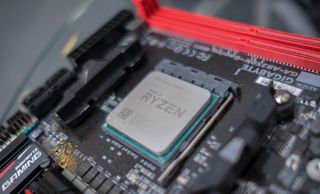AMD is eating up Intel’s CPU market share – but supply issues could spoil the party
Ryzen is going great guns – but could supplies start to run short?

AMD continues to forge ahead in the processor market going by a new survey from an analyst firm, although there is a potential dark cloud on the horizon in the form of supply concerns.
Barron’s highlighted a note from Christopher Rolland, an analyst at Susquehanna Financial Group, observing that “AMD continues to take share at Intel’s expense as 7nm rolls out”, and backing that up with survey data.
- Are Intel Apollo Lake processors already dying?
- These are the best processors
- We explain how to create the best PC components list
The Susquehanna survey of more than 2,000 desktop PCs – although that’s still a relatively small sample in the bigger picture, of course – found that AMD’s CPU market share had expanded to 20% in the third quarter.
That’s up considerably from 17% last year (and an increase of 1% compared to the previous quarter).
A gain of 3% this year might not sound all that hugely significant, but remember that this effectively represents an uptick of almost a fifth compared to 2018.
Rolland also observed that the new Ryzen 3000 chips will likely continue to push AMD forward in terms of market share, and we’d obviously agree – as these chips are evidently selling very well from some sources we’ve seen.
Furthermore, AMD allegedly has a couple of powerful budget CPUs waiting in the wings to attack Intel at the more affordable end of the market.
Get daily insight, inspiration and deals in your inbox
Get the hottest deals available in your inbox plus news, reviews, opinion, analysis and more from the TechRadar team.
And of course Intel is being slow to respond to the Ryzen 3000 threat, as next-gen Comet Lake desktop CPU challengers aren’t due until 2020 (hopefully early on next year, but that’s speculation at the moment – it could be later, particularly given how well-acquainted Intel has been with slippage in recent times).
Blot on the landscape
However, the blot on the CPU landscape for AMD is Rolland’s final observation that: “AMD may be currently supply-constrained for its 7nm chips, according to a conversation with a PC industry contact.”
We’ve certainly seen evidence that stock levels of certain chips have been struggling to meet demand, such as the flagship Ryzen 9 3900X, which has been thin on the ground since launch, and still continues to be even today.
While the industry source may simply be referring to these current stock struggles, which have been obvious enough, remember that this comment comes in the wake of the recent revelation that TSMC is struggling to meet the demands being made of it in terms of 7nm production.
TSMC is the big chip-maker which manufactures AMD’s 7nm Ryzen 3000 processors (and Navi graphics cards), and it has just tripled its production lead time on 7nm hardware to six months, which as we discussed earlier this week could have potentially negative ramifications for the future supply of AMD CPUs and GPUs.
Although any impact of the TSMC situation shouldn’t be felt in the shorter-term, as AMD will have secured watertight contracts to ensure 7nm supply in that nearer timeframe.
Further out, though, production could become more of a concern, and an observation of supply constraints being picked out by this analyst firm are hardly likely to make anyone feel more comfortable with the situation.
Hopefully AMD will be able to maintain its Ryzen 3000 momentum, though, and of course we can hardly judge just yet. One thing’s for certain, and that’s the fact that the new Ryzen 3000 processors are clearly gobbling up Intel’s market share as it stands.
- We'll show you how to build a PC
Darren is a freelancer writing news and features for TechRadar (and occasionally T3) across a broad range of computing topics including CPUs, GPUs, various other hardware, VPNs, antivirus and more. He has written about tech for the best part of three decades, and writes books in his spare time (his debut novel - 'I Know What You Did Last Supper' - was published by Hachette UK in 2013).
Most Popular


